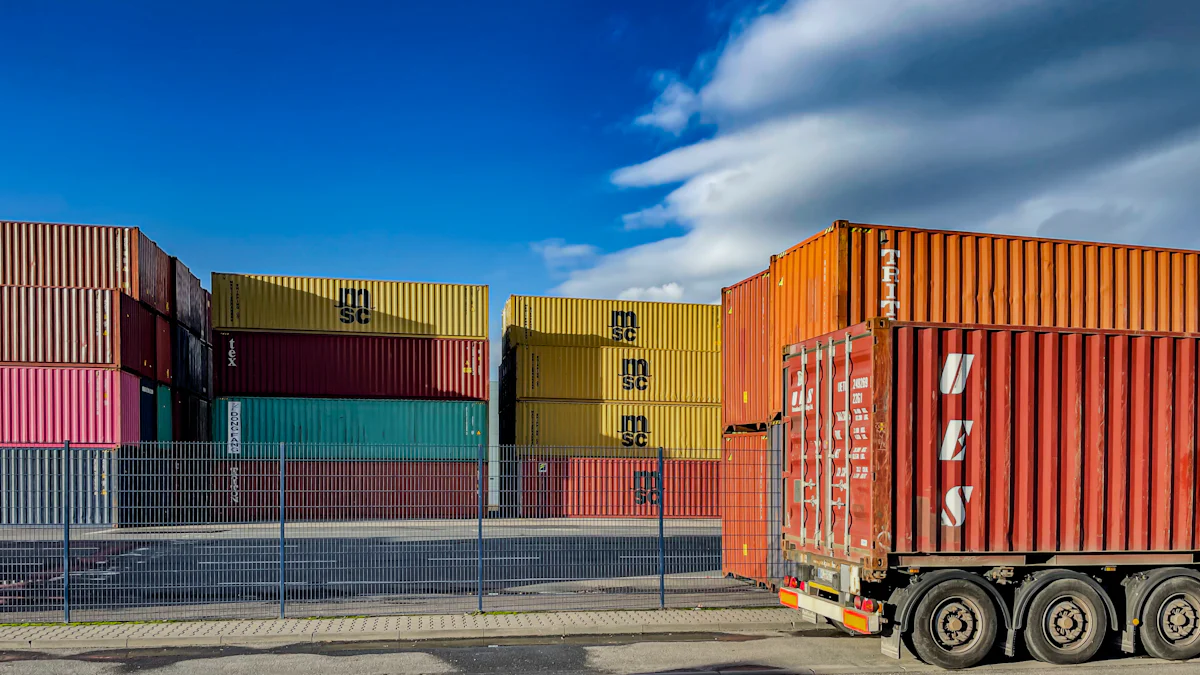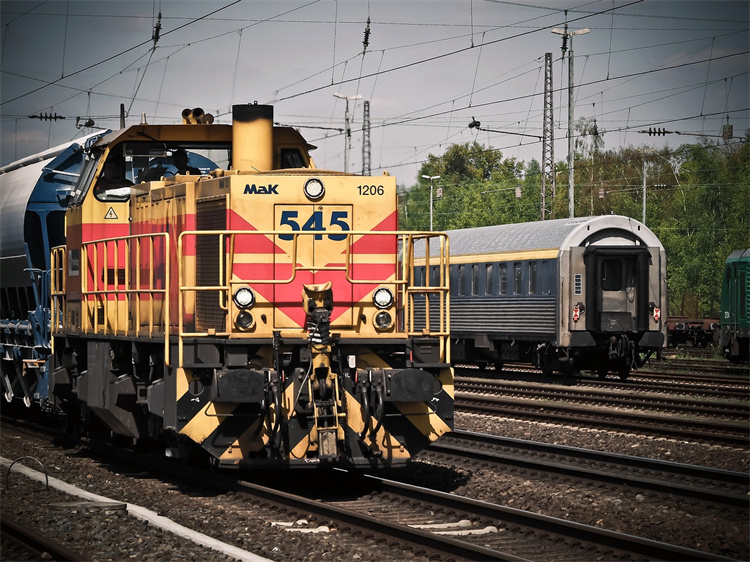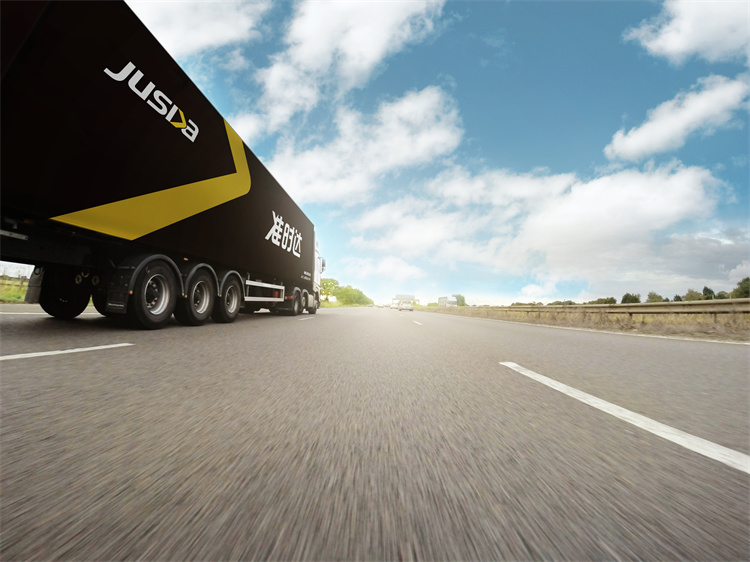Understanding Straight Trucks in the Modern Logistics Industry

A straight truck, also known as a box truck, features a single frame connecting the cab and cargo area. You often see these trucks delivering goods locally. Their compact design makes them essential in land transport. Straight trucks play a vital role in logistics by ensuring efficient transportation of goods, especially in urban areas.
Key Takeaways
Straight trucks, also called box trucks, are great for city deliveries.
They are small and easy to drive in tight spaces.
These trucks are cheaper to use for short trips than big trucks.
They can carry many things like store goods, fresh food, and building supplies.
This makes them useful for lots of different jobs.
What Are Straight Trucks in Land Transport?

Definition and Key Characteristics of Straight Trucks
A straight truck, often referred to as a box truck, is a commercial vehicle with a unique design. Its cab and cargo area are connected by a single frame, making it a single-unit structure. Unlike semi-trucks, which can detach their trailers, a straight truck keeps everything integrated. These trucks typically range from 10 to 26 feet in length and can carry freight weighing up to 33,000 pounds. Their compact size and design make them ideal for local deliveries and frequent stops.
Straight trucks are versatile and can handle various types of freight. They are commonly used in land transport for short-distance deliveries. Their single-frame design also makes them more cost-effective to operate compared to larger vehicles like tractor-trailers.
How Straight Trucks Differ from Other Transportation Vehicles
Straight trucks stand out in the transportation industry due to their design and functionality. Unlike semi-trucks, they do not have a fifth wheel or a detachable trailer. This makes them easier to maneuver in tight spaces, such as urban streets or narrow alleys. They also have lower operational costs because of better fuel efficiency and simpler maintenance.
These trucks are best suited for short-haul deliveries, while semi-trucks excel in long-haul transportation. Licensing requirements also differ. Operating a straight truck requires a Class B CDL, whereas semi-trucks need a Class A CDL.
Criteria | Straight Truck | Semi-Truck |
|---|---|---|
Design | Single frame with all axles connected | Can detach cargo area from the tractor |
Operational Costs | Generally lower due to efficiency | Generally higher due to size and complexity |
Versatility | More versatile for tight spaces | Less versatile due to larger size |
Work Load | Ideal for short-haul deliveries | Suited for long-haul deliveries |
Loading Capacity | Lower due to smaller size | Higher due to larger size |
Licensing | Requires Class B CDL | Requires Class A CDL |
Common Industries Utilizing Straight Trucks, Including JUSDA's Expertise
Straight trucks play a vital role in several industries. In transportation and logistics, they are used for local deliveries and navigating narrow streets. Retail businesses rely on them to deliver goods to stores or distribution centers. The construction industry uses these trucks to transport materials like lumber and tools to job sites. Food and beverage companies often equip them with refrigeration units to carry perishable items. Service-based industries, such as plumbing or landscaping, use them to transport specialized equipment.
Industry | Specific Applications |
|---|---|
Transportation & Logistics | Local deliveries, navigating narrow streets, accessing loading docks |
Construction | Transporting materials like lumber, steel beams, and tools to sites |
Retail | Delivering goods directly to stores or distribution centers |
Food & Beverage | Transporting perishable items with refrigeration units |
Service-based Industries | Carrying specialized equipment for plumbing or landscaping operations |
JUSDA, a leader in the logistics sector, leverages straight trucks to provide efficient land transport solutions. With expertise in industries like retail, FMCG, and automotive, JUSDA ensures timely and reliable freight delivery. Their services optimize supply chain operations, making them a trusted partner in the transportation industry.
Dimensions and Specifications of Straight Trucks
Typical Dimensions and Weight Capacities
Straight trucks come in various sizes and weight capacities to meet different transportation needs. These vehicles typically range from 10 to 26 feet in length, making them suitable for short-distance deliveries. Their compact design allows them to navigate urban areas with ease. The table below highlights the typical dimensions and weight capacities of straight trucks based on their type and class:
Straight Truck Type | Truck Class | Max Load Capacity (lbs) |
|---|---|---|
Standard Vans & Pickup Trucks | 3 | 5,250 |
Large Vans & Box Trucks | 4 | 7,250 |
Standard Delivery Trucks | 5 | 8,700 |
Large Delivery Trucks | 6 | 11,500 |
Heavy-Duty Straight Trucks | 7 | 18,500 |
Large Heavy-Duty Straight Trucks | 8a | 54,000 |
Variations in Size and Configurations for Freight Needs
Straight trucks offer flexibility in size and configuration, making them ideal for diverse freight requirements. Their lengths and capacities allow them to handle various goods, from furniture to temperature-sensitive items. Common configurations include box trucks for general freight, refrigerated trucks for perishables, and flatbed trucks for oversized items. Businesses like couriers, furniture companies, and movers often rely on these trucks for their ability to make frequent stops and navigate tight spaces. Specialized designs, such as crane cargo trucks and rubbish trucks, further enhance their versatility.
Regulatory Considerations in Land Transport
Operating a straight truck involves adhering to specific regulations. Drivers of larger trucks must hold a commercial driver’s license (CDL). Regulatory standards cover load capacity, emission levels, and safety equipment. Regular inspections ensure compliance and maintain safety. Additionally, rules often mandate maximum driving hours and rest periods to promote driver alertness. These regulations vary by region but aim to ensure safe and efficient operations.
Freight Suitability for Straight Trucks
Types of Freight Ideal for Straight Trucks
Straight trucks excel at transporting freight that requires flexibility and efficiency. These vehicles are perfect for short-distance deliveries and urban environments. You can use them for a wide range of freight types, including:
Retail goods like clothing, electronics, and other consumer products.
Perishable items such as food and medical supplies, which need refrigerated trucks to maintain proper temperatures.
Furniture and appliances, as their spacious cargo areas accommodate large household items.
Construction materials, including tools and building supplies, often transported on flatbed trucks.
Office equipment like desks and chairs, ideal for business relocations.
Their versatility makes straight trucks a reliable choice for businesses across various industries. Whether you need to move delicate perishables or bulky furniture, these trucks provide the right balance of space and maneuverability.
Examples of Common Freight, Including E-commerce and Retail
Straight trucks play a critical role in freight shipping for e-commerce and retail sectors. They handle a variety of cargo types, ensuring timely and efficient deliveries. Common examples include:
Retail goods such as clothing, electronics, and small appliances.
Perishable items like fresh produce and frozen foods, transported in refrigerated box trucks.
Furniture and appliances, which require spacious cargo areas for safe delivery.
Construction materials, including tools and equipment for small projects.
Office equipment, often moved during business relocations.
In e-commerce, straight trucks ensure quick last-mile deliveries, helping businesses meet customer expectations. Their ability to navigate urban areas and make frequent stops makes them indispensable for retail and online shopping logistics.
How JUSDA's China-Europe Express Rail Complements Freight Solutions
JUSDA’s China-Europe Express Rail enhances freight shipping by bridging the gap between continents. While straight trucks excel in short-distance deliveries, this rail service offers a cost-effective and faster alternative for long-haul freight move needs. It supports a variety of cargo, including electronics, clothing, and medical supplies. By integrating rail transport with straight truck services, JUSDA ensures seamless freight movement from warehouses to final destinations. This combination optimizes supply chains, reduces transit times, and improves overall efficiency. You can rely on JUSDA’s expertise to streamline your logistics operations and meet diverse freight requirements.
Advantages of Using Straight Trucks in Transportation

Cost-Effectiveness for Short-Distance Freight
Straight trucks offer a cost-effective solution for short-distance freight transportation. Their smaller size and lighter weight contribute to better fuel efficiency, reducing operational costs. When compared to larger vehicles like dry vans, straight trucks emerge as a more affordable option for local deliveries. Their design also facilitates quick loading and unloading, which minimizes downtime and further lowers expenses.
For businesses frequently transporting goods locally, straight trucks provide significant savings. Lower fuel consumption and reduced maintenance costs make them an ideal choice for short-haul transportation. This affordability benefits industries like retail, food and beverage, and service-based operations, where frequent deliveries are essential.
Vehicle Type | Operational Costs |
|---|---|
Straight Trucks | Lower fuel efficiency, maintenance, insurance, and driver salaries |
Tractor Trailers | Higher fuel efficiency, maintenance, insurance, and driver salaries |
Maneuverability in Urban and Regional Areas
Navigating congested urban streets or tight regional spaces can be challenging for larger vehicles. Straight trucks excel in these environments due to their compact size and superior maneuverability. You can easily drive and park them in narrow streets, residential areas, or limited parking zones. Their design reduces the need for complex maneuvers, making them efficient for city deliveries.
Straight trucks simplify driving and parking in tight urban spaces.
They are ideal for deliveries in narrow streets and residential areas.
Their compact design allows access to loading docks and tight alleyways.
Local delivery companies, moving services, and food distributors often prefer straight trucks for their ability to navigate urban environments. Their versatility ensures efficient transportation even in areas with limited access.
Faster Loading and Unloading Times for Efficient Operations
Straight trucks are designed to streamline loading and unloading processes. Their box-shaped cargo area allows for quick handling of freight, saving valuable time. Many models include hydraulic lift gates or ramps, which make loading heavy or bulky items easier. Lower deck heights also enhance accessibility, reducing the effort required to load or unload goods.
This efficiency makes straight trucks a popular choice for last-mile delivery. You can rely on them to transport freight like retail goods, furniture, or perishable items quickly and effectively. Faster loading and unloading improve delivery times, helping businesses meet tight schedules and customer expectations.
Straight trucks have a box-shaped cargo area for quick freight handling.
Hydraulic lift gates or ramps simplify loading heavy items.
Lower deck heights enhance accessibility, reducing effort and time.
Their operational efficiency ensures that businesses can optimize their transportation processes, making straight trucks indispensable for short-distance freight needs.
Limitations of Straight Trucks
Capacity Constraints Compared to Larger Trucks
Straight trucks are compact and designed for lighter loads. Their single-frame structure limits the amount of freight they can carry. For example, these trucks have a maximum Gross Vehicle Weight Rating (GVWR) of 33,000 pounds. In comparison, tractor-trailers can handle up to 80,000 pounds. This difference makes straight trucks ideal for smaller loads but unsuitable for bulkier or heavier freight.
Truck Class | |
|---|---|
Standard straight truck | 5,200 |
Box Trucks | 7,200 |
Standard Delivery Trucks | 8,700 |
Large Delivery Trucks | 11,500 |
Heavy-Duty Straight Trucks | 18,500 |
Large Heavy-Duty Straight Trucks | 54,000 |
Tractor-Trailer | 80,000 |
If your business requires frequent transportation of large or heavy freight, straight trucks may not meet your needs. Their smaller size makes them better suited for short-distance deliveries rather than large-scale operations.
Unsuitability for Long-Haul Freight Transportation
Straight trucks are not designed for long-haul freight transportation. Their compact size and limited cargo capacity make them less efficient for extended distances. Tractor-trailers, with their detachable trailers and powerful engines, are better equipped for long-haul routes.
Straight trucks are ideal for lighter loads and shorter distances.
Their single-frame design limits the amount of freight they can carry.
Tractor-trailers can transport heavier and bulkier loads over long distances.
If your business involves cross-country or intercontinental freight transportation, straight trucks may not provide the efficiency or capacity you need.
Challenges in Scaling for Large-Scale Operations
Straight trucks face several challenges when scaling for large-scale logistics operations. Their limited capacity can hinder their effectiveness in handling high volumes of freight. Operating and maintenance costs, including fuel, insurance, and repairs, can also strain logistics budgets.
Limited capacity reduces their suitability for large-scale freight operations.
High operating costs impact overall profitability.
Maneuvering large straight trucks in urban areas can lead to delays and increased fuel consumption.
Logistics companies often find it challenging to integrate straight trucks into their fleets for large-scale operations. These trucks work best for specific tasks like local deliveries or last-mile transportation, where their compact size and maneuverability shine.

JUSDA Solutions
To provide you with professional solutions and quotations.
Straight trucks play a vital role in land transport and modern logistics. Their compact size allows you to navigate narrow streets and access loading docks with ease. These trucks excel in local deliveries, making frequent stops to meet the demands of businesses requiring multiple drop-offs. Their versatility extends to last-mile delivery, construction, and waste management.
By integrating straight trucks into your transportation strategy, you enhance efficiency and reliability in urban and regional areas. JUSDA further elevates logistics solutions with its China-Europe Express Rail, bridging continents and optimizing supply chains. Together, these innovations ensure seamless freight movement across the industry.
See Also
Mastering Lean Logistics For Success In Tech Manufacturing
Analyzing The Future Trends In LTL Freight Transport
Transforming Logistics: The Role Of Digital Innovations Ahead
Unlocking The Power Of AI In Logistics Management
Get Prepared: Discovering New Transport Technologies For Supply Chains
